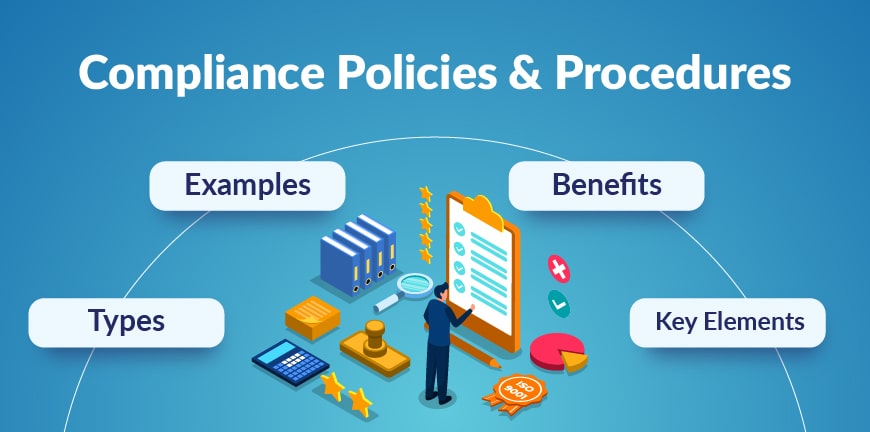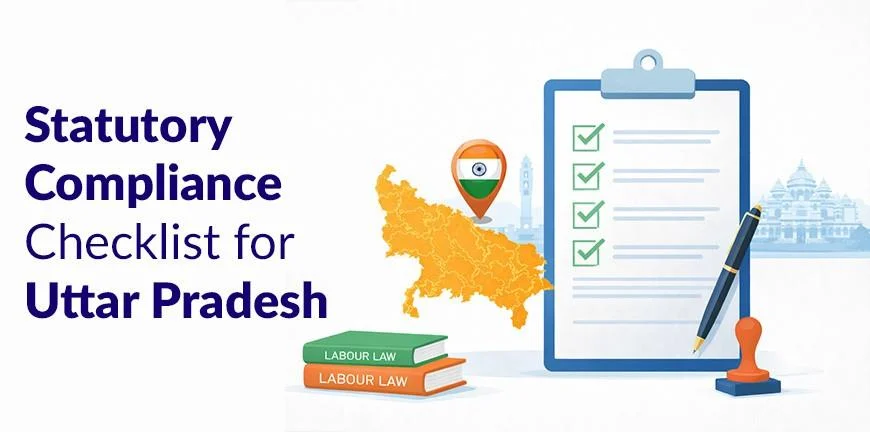
Bridging the Gap: How is India Addressing Skills Shortages?
23/04/2025
What is Labour Shortage and How to Overcome it?
24/04/2025- Introduction
- What is the definition and meaning of policy compliance?
- What are the Key Elements of an Effective Compliance Policy?
- What are the Types of Compliance Policies?
- What are the Examples of Compliance Policies?
- What is the Compliance Policy Procedures?
- What are the Benefits of Compliance Policies?
- What are the Common Challenges and Solutions of Compliance Policies?
- Solutions
- Frequently Asked Questions (FAQs)
A few missteps can lead to lawsuits, fines, or even decline in trust. Compliance policies are the guidelines that keep businesses on the road to integrity and success. Compliance policies define the rules, standards and procedures that makes sure a company operates within the framework of legal, regulatory, and internal guidelines.
Introduction
Compliance policies ensure transparency, eliminate risk, and protect the interests of stakeholders, including employees, clients, partners, and regulators. Whether related to labour laws, data protection, industry-specific regulations, or internal codes of conduct, compliance policies help create a culture of accountability and trust.
By clearly defining acceptable behaviour and operational practices, they support consistent decision-making and reduce the risk of legal or reputational harm.
What is the definition and meaning of policy compliance?
Policy Compliance ensures that an organisation aligns with certain set standards, rules and regulations by a governing body or an organisation. It involves identifying, assessing, controlling, and maintaining activities to comply with these standards.
Compliance policies cover various aspects of organizational operations including financial practices, employee behaviour, data protection and environmental standards. Compliance policies are essential to safeguard organizations from risks and uncertainties.
What are the Key Elements of an Effective Compliance Policy?
Compliance policies are created and implemented to ensure that an organization operates legally and ethically. Some of the key elements of an effective compliance policy are-
1. Written policies and procedures
Meticulously detailed, accessible written policies and procedures are important to define compliance expectations. These policies cover aspects of business that are related to legal, ethical, and regulatory requirements.
2. Compliance Officer and Committee
Having a designated compliance officer and a compliance committee ensures full accountability. The former and latter are responsible for reviewing policies and procedures, developing training programs and communicating with the employees to ensure they understand and abide by these policies.
3. Training and Education
Employees are trained and educated through tailored programs to ensure they understand and abide by the compliance policies. Every organization must create programs that are tailored to specific needs of the organization.
4. Open Communication
A company must have open communication channels to encourage employees to report violations or concerns they may have noticed. This culture of transparency and accountability can make a significant difference to the mindset of employees and an organization.
5. Auditing and Monitoring
Monitoring compliance activities regularly is essential as it helps identify potential issues and lets you know the effectiveness of the program and thereon allow you to modify the program to suit your needs.
6. Enforcement
Well-defined disciplinary guidelines are essential for ensuring that violations of compliance policies are addressed appropriately and that a clear message is communicated about the importance of compliance.
What are the Types of Compliance Policies?
Compliance Policies are of two types- Corporate compliance policies and regulatory compliance policies. Both play a key role in ensuring your business is operating as per the set policies and procedures.
1. Corporate Compliance Policies
Corporate Compliance Policies are crated and implemented to ensure that all employees and the organisation as a whole, abide by the standards and protocols set by governing bodies or policy committees. The policies cover areas like employee behaviour, financial practices, data security and corporate governance.
The aim of the corporate compliance policy is to ensure all employees act ethically and in the best interests of the organization. For example, an anti-harassment policy ensures that employees are protected from hazing, discrimination and are provided with an environment that is safe and inclusive.
2. Regulatory Compliance Policies
Regulatory Compliance Policies refer to adherence to laws and regulations set by external bodies such as government bodies, industry specific organizations or international standards. It ensures that businesses operate adhering to specific standards, following ethical principles, avoiding legal penalties, maintain licenses and build trust with external regulatory bodies.
An example of regulatory compliance includes environmental compliance which is imposed with focus on safeguarding the environment. Industries are required follow certain rules to not harm the surrounding causing as less damage as possible. The regulations could be related to waste management, emissions, pollution control, and sustainable practices.
What are the Examples of Compliance Policies?
Compliance policies are essential rules and guidelines that ensure an organization adheres to both internal standards and external regulations and operate within legal and ethical guidelines and standards. Some of the main examples of compliance policies are-
1. Code of Conduct
One of the most important policies, the code of conduct policy defines behavioural standards expected by employees. This could include ethical behaviour, confidentiality, conduct with colleagues, conflict of interest etc.
2. Anti-Harassment Policy
An anti-harassment policy ensures that employees are protected from hazing, discrimination and are provided with an environment that is safe and inclusive. The policy includes details of consequences of violating the policy, reporting procedures and more.
3. Data Protection Policy
Protecting data is one of the most critical tasks especially in today’s digital age where there is so much room for cyberattacks. The data protection policy includes the measures an organisation must take to safeguard personal and confidential information which include data encryption, access controls and protocols.
4. Environmental Compliance Policy
An environmental compliance policy is imposed with focus on safeguarding the environment. Industries are required follow certain rules to not harm the surrounding causing as less damage as possible. The regulations could be related to waste management, emissions, pollution control, and sustainable practices.
5. Whistleblower Policy
A whistleblower policy encourages employees to report unethical or illegal activities without fear of retaliation. It outlines the process for reporting concerns and ensures protection for those who come forward.
6. Financial Compliance Policy
The financial compliance policy outlines the procedures and practices that an organization must follow related to financial operations including accounting standards, fraud prevention, and money laundering prevention. This ensures compliance with relevant laws and regulations and prevents financial mismanagement and fraud.
7. Workplace Safety policy
Workplace safety policy is a set of guidelines and standards that outline an organization’s commitment to ensuring a safe and healthy work environment for all employees. It includes procedures for accident prevention, emergency protocols and hazard communication.
What is the Compliance Policy Procedures?
Compliance Policy Procedures are detailed policies an organization must implement to ensure adherence to legal, regulatory, and internal company standards. Compliance procedures make sure that organizations and its employees follow ethical conduct, maintain integrity and eliminate legal penalties.
- Compliance policies and procedures provide the right steps for employees to follow while carrying out tasks related to organizational policies.
- Implementation of policies into actions ensuring proper application across all departments in an organisation.
- Eliminates risk as the implementation of the compliance policies and procedures prevents mistakes.
- Compliance policy covers areas like financial reporting, protection of data, employee behaviour and environmental regulations.
- Promotes ethical behaviour by setting expectations for employee conduct, fostering and culture of responsibility.
What are the Benefits of Compliance Policies?
Compliance policies offer numerous benefits, including risk mitigation, legal protection, improved reputation, enhanced operational efficiency, and greater employee morale
1. Avoids legal liabilities
No business wants to fall prey to legal liabilities. Compliance policies help businesses identify potential risks and address them effectively steering clear of fines. Upholding compliance instils a sense of trust and builds company image. Noncompliance leads to damage of company’s reputation.
2. Safer, inclusive workplace for employees
Having legal guidelines set in place for an organization can be one of the major benefits of compliance in a company. Regulations regarding discrimination and harassment help the organization create a better working environment for the employees, which can lead to more safety, and security and in return more worker productivity.
3. Enhanced Company Operations
Understanding how compliance can create strong business standards and implementing them can boost the growth of the company. It is the organization’s way of creating a positive working environment and a healthy work culture. This can only be achieved if the organization has clear compliance policies and procedures, which is a set of guidelines or policies that ensure employees’ and clients’ fairness and safety.
4. Boost employee retention
Including policies and procedures in your employee handbook that mirror your legal compliance obligations, is always a good step. it is important for employees to feel that they work in a fair, professional, and safe environment. Evoking this feeling will make them build loyalty and in turn, they will tend to stay with the company for a longer period. Check-in with managers or supervisors regularly to ensure complaints are handled properly and fairly.
5. Builds trust and confidence
Compliance policies demonstrate a commitment to ethical practices, building trust with customers, investors, and other stakeholders. A strong compliance program can make a business more attractive to potential clients and partners.
What are the Common Challenges and Solutions of Compliance Policies?
Some of the common challenges and the solutions to keep up with the compliance polies are as follows-
1. Changing Regulations
Regulatory landscapes are constantly changing, making it difficult to stay up-to-date and adapt policies accordingly.
2. Compliance across multiple regions
Maintaining and managing compliance across various regions can get complicated as every region has its own set of rules and regulations to be followed
3. Training and awareness
Making sure every employee understands and follows compliance policies require proper training and education. Failing to do so can create lesser morale and productivity.
4. Higher cost
Implementing and maintaining compliant policies can get costly as it includes expenses of training, monitoring, and auditing. It also needs a lot of time and effort.
5. Vendor management
Making sure a company’s external vendors and partners also adhere to the compliance policies and procedures is challenging.
6. Standard procedures and documentation
Lack of standardized procedures can lead to errors and non-compliance.
Solutions
1. Effective training
Develop training modules to educate and train employees and update them on changing policies and procedures
2. Culture of Compliance
Keep open lines of communication and encourage employees to report violations and inconsistencies, fostering a culture of compliance.
3. Regular audit
Conduction of regular audits can help identify areas of potential risks and help address them with effective measures.
4. Technology
Utilize technology to streamline compliance processes, improve data collection, and enhance visibility.
5. Vendor management
Implement robust vendor management programs to assess and mitigate risks associated with third parties.
Frequently Asked Questions (FAQs)
1. What is a compliance policy?
A compliance policy includes a set of rules and guidelines that ensure an organization keeps up its legal and ethical standards. They are in place to help mitigate risks, prevent legal issues, and promote transparency and accountability.
2. Why are compliance policies important?
Well-crafted, relevant compliance policies ensure ethical practices not only helps provide employees a safer and inclusive work environment but also helps a company to build trust among customers, shareholders, and third-party agents and boost the company’s reputation.
3. What are examples of compliance policy?
As stated above in the article, there are numerous examples of compliance policies such as code of conduct, anti-harassment policy, financial compliance policy, environmental compliance policy, whistleblower policy, workplace safety policy and more.
4. How often should compliance policies be reviewed?
Ideally, compliance policies must be reviewed at least once a year. Other times when you may need to review, include large-scale organizational changes, changes in laws or regulations, and incident or policy violations.
5. Who is responsible for enforcing compliance policies?
A compliance officer or a compliance committee is responsible for enforcing compliance policies.
6. How do compliance policies help in risk management?
Compliance policies help in identifying applicable regulations, assessing non-compliance risks, assigning responsibilities for managing the risks, adopting controls, and continuous monitoring for improvement.
7. How do I create a compliance policy template?
The first step while creating a compliance policy template is to define the purpose and objectives of your policy. Identify the regulations and standards that apply to your organization and establish achievable goals for compliance.
8. What is a non-compliance policy and why is it important?
A non-compliance policy outlines procedures that can help address failures while meeting established rules, regulations, and standards. It is important because it helps organizations understand what they are obliged to, identify and document non-compliant events and implement the right actions to prevent it in the future.
9. How is policy compliance audited within a company?
A policy compliance can be audited within a company by ensuring adherence to internal and external polices set by the company and governing bodies.

Hariharan Iyer
Hariharan Iyer is the Vice President – Operations at ALP Consulting, bringing over 40+ years of experience in HR outsourcing and labour law compliance. He leads end-to-end HRO operations, ensuring process efficiency, statutory compliance, and seamless service delivery for clients across industries. With a strong background in labour law governance and workforce management, Hariharan plays a key role in driving operational excellence and compliance-led HR solutions at ALP Consulting.




